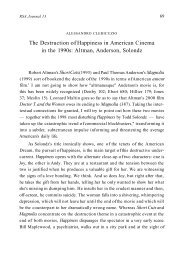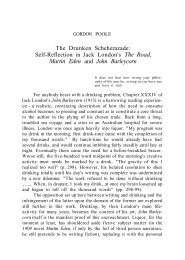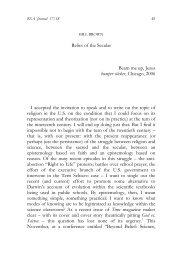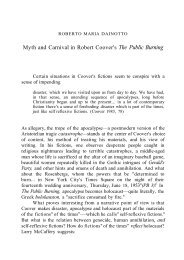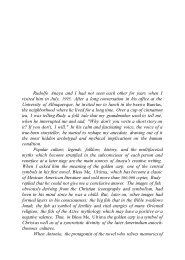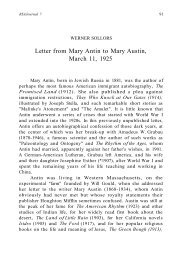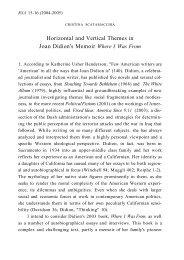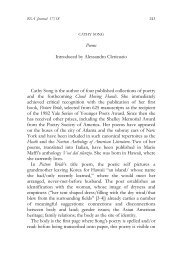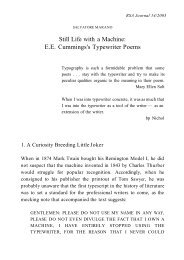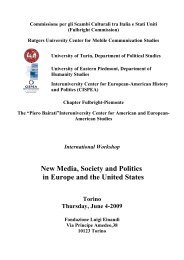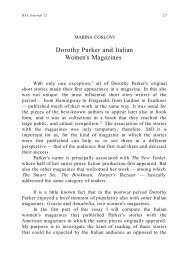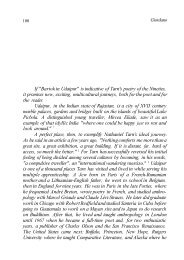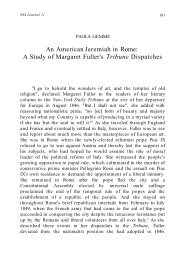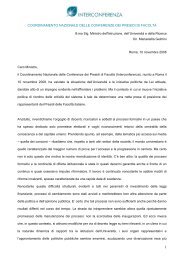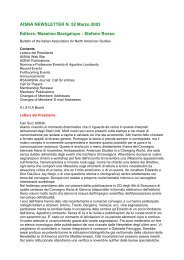NEWSLETTER #56 - aisna
NEWSLETTER #56 - aisna
NEWSLETTER #56 - aisna
Create successful ePaper yourself
Turn your PDF publications into a flip-book with our unique Google optimized e-Paper software.
AISNA Newsletter 56, p. 48<br />
finding other ways of reconceptualizing and rethinking it is becoming all the more necessary. The<br />
lecture was followed by responses from Cristina Giorcelli, Carlo Martinez, and Elena Spandri.<br />
The lively and high-level debate following all sessions proved not only the enthusiastic<br />
interest of all the participants but also the timeliness of this meeting, which ended with the<br />
presentation of the volume America at large. Americanistica transnazionale e nuova<br />
comparatistica, edited by Giorgio Mariani and Donatella Izzo. Alessandro Portelli and Vincenzo<br />
Maggitti outlined the most interesting features of this volume, respectively from the point of view<br />
of American Studies and of Comparative Literature.<br />
Mena Mitrano, MLA 2004, Dec. 27-30, Philadelphia<br />
I was one of the speakers in the special session “Brooks and Warren’s Understanding Poetry:<br />
Lasting Influences and Troubling Legacies” (7:15-830 p.m., room 406, Philadelphia Marriott). My<br />
paper was titled “Milk Cans and Well-Wrought Urns: Robert Rauschenberg and Close Reading.”<br />
Our session leader was John (Jack) Kerkering (Loyola Univ., Chicago), who presented a paper on<br />
“Racial Scansion and Rhapsody in Metered Lines and Raced Bodies.” The other speakers were:<br />
Steven L. Newman (Temple Univ.), “The Call of the Popular: The Ballad as a Revision of Lyric”<br />
and Jennifer Ashton (Univ. of Illinois, Chicago), “The New Cognitivists and the Old: or, The New<br />
Critical Legacy of the ‘Embodied Mind.’”<br />
The themes of the MLA Convention this year were the future of the humanities and the<br />
question of beauty. Both were taken up with particular eloquence in one of the most representative<br />
panels: “The Future of the Humanities in a Fragmented World.” Presided by Rey Chow, the panel<br />
featured distinguished speakers like Toni Morrison (Princeton Univ.), Gayatri Chakravorty Spivak<br />
(Columbia Univ.), and Ngahuia Te Awekotuku (Univ. of Waikato, New Zealand). Morrison’s<br />
speech began by expounding on the difference between humanity and citizenship. People who are<br />
forced to be without citizenship have the right to claim human rights. Having thus introduced the<br />
problem of the “distribution of wealth and knowledge” in a more humane society, Morrison went on<br />
to meditate on the desirability of speed in the present age. If the digitalized age seems to promise<br />
more time--and with it more life--it is also haunted by the fear of indistinguishability. There<br />
persists, Morrison says, a powerful yearning for singularity “at the root between individuality and<br />
community.” One of the tasks of the Humanities, therefore, is to assert singularity in the public<br />
sphere. Morrison invites us to consider the uses to which art can be put, scholarship among them,<br />
and to investigate art’s relation to conformity. Art, she says, is neither an ambassador nor a<br />
distraction: “it is incendiary; it can frighten us.” It is, above all, “a practice of knowledge unseduced<br />
by its own beauty.”<br />
What is beauty? How should it be redefined in the contemporary world? For Professor<br />
Ngahuia Te Awekotuku, who researches the origins, technology, and narratives of Maori skin<br />
adornment, and also investigates contemporary practice, attitudes and expressions, these questions<br />
are being posed especially by emergent literatures. Finally, Spivak lamented the little role that the<br />
Humanities have in the U.S. despite the discourse on difference. In agreement with Morrison, she<br />
invoked a redistribution of resources and denounced the rift between writing and criticism, referring<br />
to “the shame of this rift.”<br />
Robert Scholes’ Presidential Address received a standing ovation. Scholes dwelt on the<br />
failure of theory in challenging techno-bureaucracy and focused on the responsibility of the<br />
Humanities to justify its place in the present world.<br />
One of the panels paid homage to Stanley Fish on the occasion of his retirement. Another<br />
celebrated the heritage of Edward Said, with particular attention to the uses of his later writings in<br />
the field of Disability Studies. Two panels were devoted to the memory of Phyllis Franklin who<br />
died this past August. She was executive director of the MLA from 1985 to 2002. During her tenure<br />
she strenghtened the financial position of the association and championed the humanities by<br />
working at bridging the gap between academia and the world outside. She was instrumental in



